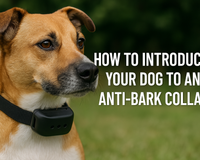Maintaining a positive relationship with your neighbour is vital. We know it doesn’t sound important, but if the people you share a patch of lawn with are annoyed at you, it does make life a little harder.
We have put together some things you can do if your neighbours have complained about your barking dog. These are some strategies to use to keep your relationship with your neighbour positive and to help with the nuisance barking.
1. Avoid Being Defensive
The natural instinct when your neighbour complains about your dog and its nuisance barking is to be defensive. It’s human nature, and they are saying something negative about your fur baby.
But defensiveness will only make the situation worse. It’ll increase the tension, exacerbate hostility and your neighbour will be more likely to escalate the situation with your local council (trust us, you don’t want this).
We know it's hard to remember when you’re in the moment, but your neighbour’s perception of your dog's nuisance barking is their reality. Take their complaint seriously and be empathetic to their situation.
2. Listen to Your Neighbour
Don’t enter an all-out war with your neighbour; it's best to defuse the situation as soon as possible. Put your defensiveness aside and listen to what they are saying.
Your neighbour wouldn’t complain about something that isn’t real, so consider there could be some truth to what they are saying. Even if you feel they’re exaggerating the story, they could become upset or angry if they do not think you’re listening to them.
Once again, this could escalate the situation further and result in them wanting you to take immediate action. If they are saying your dog barks all day right next to their living room, there could be a bit of truth to that.
3. Be Empathetic
You don’t need to admit to any guilt to apologise, try something like “it must be frustrating to hear a dog barking all day” or “it must be annoying trying to get to sleep when a dog is constantly barking”.
Make sure you tell them that you're sorry that your dog’s barking is disturbing them. Reassure them that you don’t want to own an annoying and loud dog, and reiterate that you're looking for a solution to the nuisance barking.
Ask for some patience whilst you work through this problem, training nuisance barking out of your dog can’t be fixed overnight.
4. Investigate With Your Neighbour
Ask your neighbour some questions about your dog’s barking without offending them. Examples include “Is there a particular time when the dog barking is most annoying?”, and “is it just my dog, or can you hear other dogs also barking?”. Another question to ask could be “other than giving up my dog; what would make you happy?”
The goal is to solve the problem at hand, which is dog barking. Keeping this problem separate and asking questions that aren’t loaded will help you both work together to figure out a bit of a solution.
You need to investigate the dog barking yourself. Try talking to other neighbours and ask if they can hear one dog, or more, barking.
You could also set up a video camera to monitor your dog’s behaviour, and discover what precisely triggers your dog to bark.
5. Respect Your Local Council Laws
Our recent blog discussed what nuisance barking is as defined by local councils, and the consequences of not solving the issue. The consequence of ongoing nuisance barking varies between councils, but they all end in a fine and potentially charged in a court of law.
Make sure to talk to your local council, or check out their website, to ensure you are respecting their excessive barking laws. Most councils advise people to talk to the owner of the dog with the nuisance barking before they begin to escalate the situation.
Often, if your neighbour is complaining to you about your dog barking, it means they’ve googled what they can do, and this is just the first step. They have every right to complain to the council about excessive barking disturbing the peace, and they will have to submit evidence in the form of a journal to the council of when your dog is barking and for exactly how long.
Being helpful, open, and proactive with your neighbour now will mean they won’t ask the council to fine you or take your dog from you.
6. Don’t Make it Worse
Make sure your dog doesn’t do anything that might make the situation with your neighbour worse. For example, if you come home with your dog and they are off the leash, make sure they don’t run to greet your neighbour.
If your dog wants to play loudly, make sure that it’s not at 5 in the morning. Your neighbour may have a fear of dogs or be scared of your breed of dog. They may have a family member who is afraid of dogs, and they want you to control your dogs barking so they can feel less nervous.
Obey all local council dog laws, and avoid giving your neighbour any extra reasons to complain about you and your dog.

How Do You Deal With a Barking Dog?
It’s time to address the nuisance barking issue and give you and your neighbour some peace and quiet.Wear Your Dog Out
Consider when your dog is barking and whether or not you’re home. If your neighbour says they bark in the middle of the day when you're at work, try using enrichment toys so they can be distracted all day. You can also invest in an anti bark collar.Switch Up Your Daily Routine
If your dog barks first thing in the morning whilst you're in the shower, alter your routine, so you go outside with them. Play with them, wear them out a little, and make sure they stay quietly occupied.Try Doggy Daycare
Try enrolling your dog in a doggy daycare a couple of days a week. This will wear them out, give their doggy social life a boost and give your neighbour a couple of days of quiet.Use a Local Dog Walker
You could also look for a local dog walker in your area and get them to walk your pup whilst you’re busy at work.
Hopefully, they will be too tired to annoy your neighbours. If they are barking randomly throughout the day, see if you can reduce any triggers that set them off.
Use an Anti Bark Collar
An anti bark collar is a device your dog wears, that triggers a distraction once it detects your dog barking. Citronella barking collars or shock collars are the most effective at training the nuisance barking out of your dog.Citronella Barking Collars
Citronella barking collars emit a puff of citronella when they detect your dog barking. Usually, this is enough to stop your dog from continuing with its nuisance barking.
The citronella doesn’t harm your dog in any way and is directed at their lower jaw area so that it won’t go in their eyes. An excellent way to think of it is that it's like a human being distracted by a whistle. It’s not painful; it just captures their attention.
Dogs learn quickly that barking will result in a citronella puff, and the behaviour is modified rapidly.
Shock Collars
For a dog that is a little more stubborn, a dog shock collar is the most effective training tool. These collars emit a small static shock when they detect your dog barking.
The most common misconception is that a shock collar hurts the dog. It doesn’t, and if you are worried, test it on yourself in the palm of your hand. Most collars have a scale of intensities for the shock, so you can control how much correction your dog gets.
You will never need to set a collar to its highest intensity to distract your dog. Remember, it's just to distract them and stop them from continuing with excessive barking. We recommend keeping these on your dog for a maximum of 8 hours.
With these collars, your dog will quickly learn what happens if they bark, and their behaviour is corrected fast.
Try Enrichment Toys
Back to enrichment toys, you can try your hand at creating or buying some toys that keep your dog preoccupied during the day.
The other thing to try is keeping your dog well exercised, the more tired your dog is, the more likely they are to relax and sleep during the day instead of bark.
Keep Your Neighbour Updated
Make sure you keep your neighbour notified of everything you're trying, and check-in with them to see if they notice there is a difference. Keep a log of your actions in a diary, so you can prove, if worst comes to worst, that you have been making a conscious effort to test new training tools and methods.
Document it if your neighbour does see any improvement too. Make sure to keep the receipts of anything you buy to stop your dog from barking.
Keep your neighbour involved in the process, if they can see you’re actively doing something to stop your dog from nuisance barking, they are less likely to escalate things with the council.
If you're having some problems with your neighbours, make sure you manage the relationship and get on top of your dog's nuisance barking. If you want to stop the nuisance barking quickly, check out eDog Australia’s range of anti bark collars.









